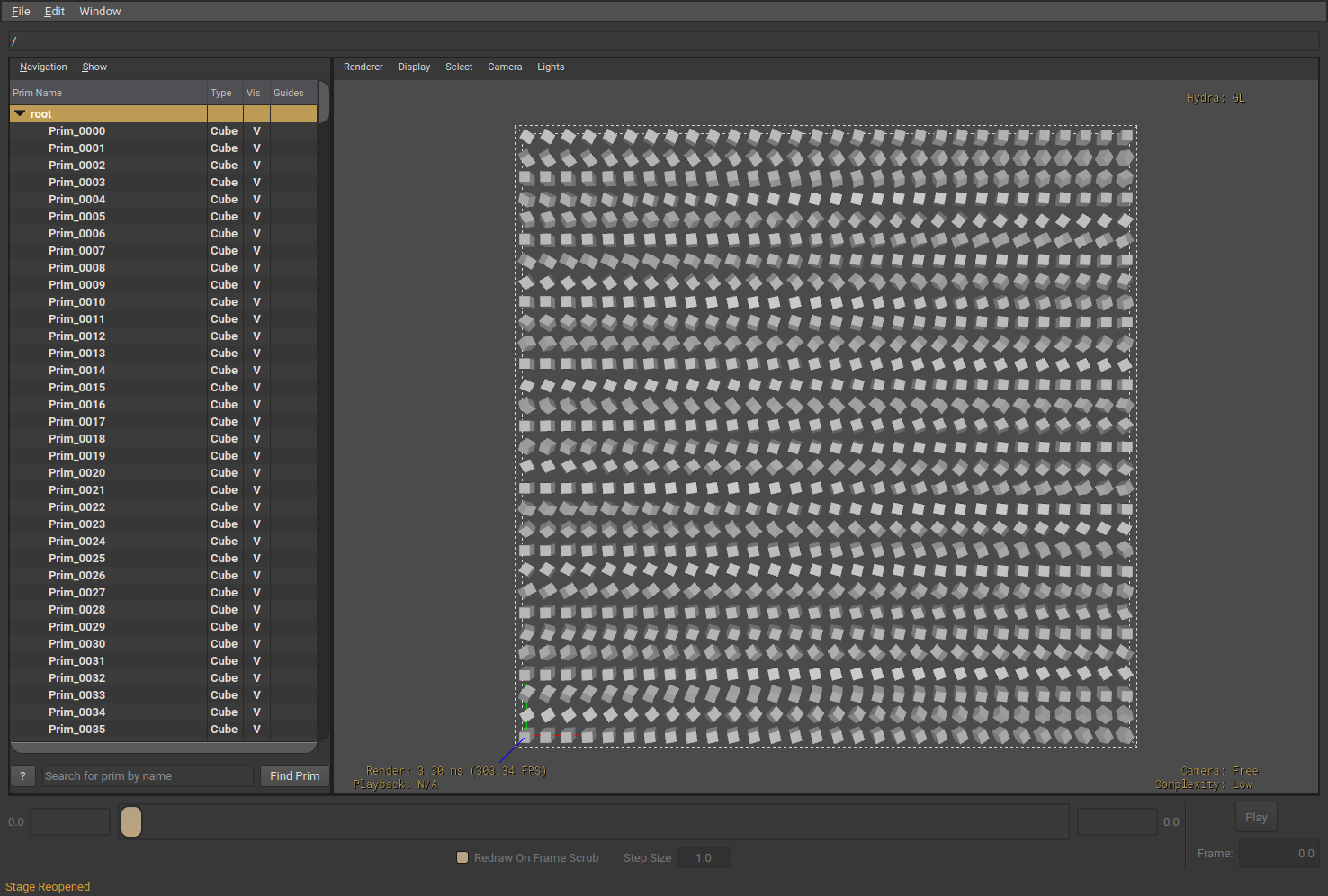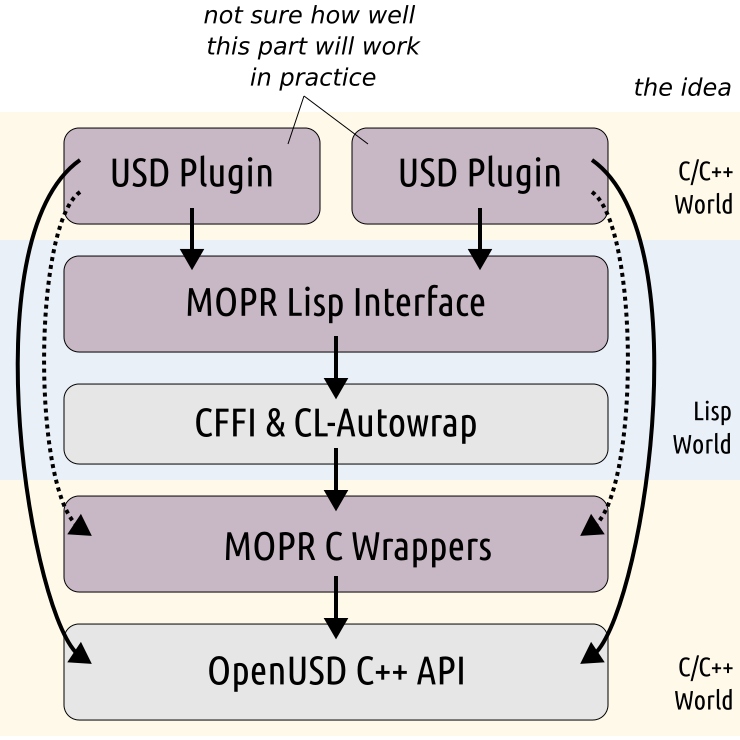Means of Production
I have been working on a personal framework for my OpenUSD related experiments, mainly in Lisp.
[ Check out all posts in “lisp” series here. ]
I was trying to hit the first milestone in my latest project, called mopr, so I couldn’t write a post for the last few days.
I just open-sourced the code of this project, but it is heavily experimental, buggy, untested, unsafe, and completely undocumented. The experimental ideas I will describe in this post are similarly unsafe. So I really don’t recommend trying any of this.1 I am just sharing it as an intellectual activity.
The repository is here. It is currently under a BSD-3-Clause license.
The acronym mopr is based on a reference to the economics term: “means of production”. I found the name suitable, since I am using mopr for experimenting with visual production related ideas.
This is a monolithic personal framework for my own VFX related experiments. So its characteristics will evolve over time, and it will likely remain heavily experimental, buggy, untested, and unsafe.
What Can It Do
Not a lot of interesting things just yet. It has the foundations that allow me to do OpenUSD-focused prototyping, mostly using Common Lisp:
- Very minimal and incomplete C and Lisp access to USD APIs like Layer, Stage, Prim.
- Support for generic data transfer from native Lisp arrays to USD’s
VtValuecontainers. - Boilerplate setup to allow integrating the code into OpenUSD plugins. This kind of integration is currently specific to Embeddable Common Lisp.
But this effort already enabled one prototype, that I call USDS.
USDS - Boring Parts
I do a lot of testing with USD content, and composition of content, usually to observe the outcome, confirm my intuition etc. I value being able to quickly prototype test data.
So the one actual feature I started implementing, is a declarative scene description language I call USDS, that allows me to populate a USD layer from native S-Expression (s-exp) forms, without explicitly calling USD APIs. The information stored is similar to usda format, but the representation allows symbolic manipulation. So it is more like what you would have if USDA was based on a generic serialization format.
I have support for scene graph tree building, and most attribute types. No metadata, relationship, or timecoded attribute support yet. I also have an extension that allows more concise syntax, but it comes with its own limitations, so I will skip that for now.
data/test module has some examples. 02.lisp looks like this:
((:tree
("hello"
("world")))
(:prim ("hello")
(:type Xform))
(:prim ("hello" "world")
(:type Sphere)))
When processed, this expression would produce usd that corresponds to usda below:
#usda 1.0
def Xform "hello"
{
def Sphere "world"
{
}
}
Clearly, the usda form is more concise in this case. But I can directly manipulate/generate the s-exp form in Lisp.
One difference is, the USDS syntax separates the scene graph tree description (:tree forms) from the definition of prims (:prim forms), because I find it error-prone and tedious to write USD attributes inside 5 levels of nesting, when I write USDA by hand for testing.
I can also define “aliases” for prim paths. Here, x is an alias, that’s later used to refer to the prim instead of by path “/b/d/e”.
((:tree
("a" :spec :class)
("b"
("d"
("e" :spec :over :alias x)))
("c"))
(:prim x
(:type Sphere))
(:prim ("a")))
This corresponds to a layer that consists of prims at: </a>, </b>, </b/d>, </b/d/e>, and </c>.
Also, multiple declarations targeting same entities is supported, which is useful when programmatically building parts of a prim or tree from independent functions.
Cooler Stuff
OK, let’s move on to slightly cooler stuff: I can register callables that I am able to trigger from within the USDS declarations.
Example: An expression like below will call the registered function test-gen-cubes with 30 as its only argument:
((:call :test-gen-cubes 30))
Obviously, what I am about to say would be a very unsafe thing to do, but if I were to then plug USDS into a file-format plugin, and opened the file that has the above form in usdview, I would see:

But again, this is a very bad idea. I only added support for callables to trigger calls from within a live programming context, where it is clear that some arbitrary execution might take place.
Anyway, callables are expected to be just usual Lisp functions that return USDS forms themselves, which then get processed normally. (But there is no mechanism in-place to sandbox the function being called, or prevent side effects.) Conceptually, the return value acts as a list that is spliced into the location of the :call form.
Example callable test-gen-cubes (called with arg N) produces a grid of NxN cubes, each looking like below:
def Cube "Prim_0002"
{
double size = 0.5
double3 xformOp:rotateXYZ = (0, 2, 2)
float3 xformOp:translate = (0, 1, 0)
uniform token[] xformOpOrder = ["xformOp:translate", "xformOp:rotateXYZ"]
}
Here is an example that mixes hardcoded data with function calls at different levels: 09_call.lisp
((:call :test-tree-gen)
(:prim :x
(:type Sphere)
(:call :test-gen-xform-info
#1A (10 0 100)
#1A (33 55 4))
(:prop "radius"
:double #0A 5.0d0))
(:call :test-gen-cubes 2))
This corresponds to the USDA file here: 09_call.usda
In this last example, we have 3 call expressions. test-gen-xform-info is a “prim-level” call, and it takes 2 arguments, both are “one-dimensional arrays” (#1A).2
Architecture
The way I currently integrate with USD roughly looks like this:

The current set of key modules in repo are:3
wrap: A very incomplete C API wrapper for some key OpenUSD modules, and minimal wrapper for miscellaneous classes.lisp: Common Lisp based implementation of various features building on thewrapmodule. This defines an ASDF system calledmopr.
These 2 key modules currently build a generic API that aims to be Common Lisp implementation agnostic. So far, that’s the case for the 2 Common Lisp implementations I am testing with: SBCL, and ECL.
I am hoping to split this part to its own respository, once the OpenUSD API coverage is good enough (and tested enough) to be independently useful. For now, it only exposes the minimal API the rest of the framework needs.
lisp module mainly consists of submodules:
ffi: Common Lisp foreign-function-interface for the API defined onwrap. This is using the ubiquitous CFFI system, and cl-autowrap library.mopr: An interface to interact with various USD concepts like theVtValueandVtArray, along with somewith-*macros to implement RAII behaviour for foreign USD objects.plug: Placeholder to make the lisp system itself pluggable. It currently only registers a few hardcodedcallables, so that thecallexpressions in the USDS declarations can trigger them.usds: This implements alistbased declarative language to express scene description that can be used to populate an OpenUSD layer.
The remaining lisp submodules are not interesting.4
On top of this, there are also some modules to allow testing this lisp-based interface in a practical fashion. Specifically, I currently use Embeddable Common Lisp based Linux-native builds of the Lisp module to integrate it into the OpenUSD runtime using USD’s own plugin system:
- The
bootmodule is built into a shared library that I use to initialize themoprECL modules. That becomes a dependency of the actual USD plugin library that will call intomoprlisp modules. plugmodule has an empty example USD “file format plugin” that integrates thebootmodule, and triggers some test code implemented in Lisp. So it doesn’t really do anything useful.
test module implements some initial Catch2 based testing. data module contains test files that I used to compare the usds forms to the reference USD ASCII format representation.
Why Common Lisp
I wrote about this a bit before. Not for any critical reasons, but:
- It is very suitable for the kind of flexible prototyping goals I have.
- It is a mature language ecosystem with some very cool properties like “homoiconicity”.
- Modern Lisp implementations find a good balance of dynamism and performance.
Goals
Here are a few things I am planning to do with this.
More Posts
Now that I have something that produces visuals, I am planning to write a series of blog posts with example procedural scenes first. (Even though this is not the most scalable (or resource-friendly) kind of proceduralism for scene content generation, it is proceduralism nevertheless.)
I am also planning to write up a bit about how I currently handle foreign objects etc.
I will add metadata etc. support soon. And hopefully, the C wrapper coverage will progressively increase. I am also planning to introduce an actual plugin interface to Lisp side.
Threading
So far, I spent no time to investigate how integrating CL-based computations into a USD plugin would work if Lisp gets called from multiple threads. I need to look into that.
I really don’t know if the OpenUSD-plugin - CommonLisp integration idea will hold well in practice.
If it does, I will likely move on to CL integration in other parts of USD, like in Hydra layer. Same fundamental data types are used on both layers, so I think it would be relatively straightforward to do similar interfacing in USD Hydra.
Data Mapping and FFI Improvements
Binary encoding of primitives is usually different between the Lisp world and the C/C++ world. So I currently don’t try to map or memcpy anything. I just iterate over the data blocks and let CFFI handle conversion. I didn’t worry about performance so far anyway. But specific optimizations might be possible, if the data passing the language boundary ends up being the bottleneck.
Also, note that I am not too experienced with FFIs. So there might be issues with my approach to bridging C++ to Lisp.
Other Implementations
Also, testing with other implementations: For now, I will continue focusing on ECL based integration. But I read that SBCL has early support for generating dynamic libraries. So I am planning to do some testing with that as well. Finally, once I am confident with the stability of various layers, I will return to investigating Clasp integration.
And since the USDS declarative syntax is basically standard s-expressions, I might test integration with a couple of Scheme implementations as well.
Sandboxed Callables
I mentioned that it is sufficient for callables to be just pure functions that produce more USDS forms. So I would like to see if it would be possible to integrate with WebAssembly, and use it as a sandbox for callables. Since WebAssembly has a text format that uses S-Expressions as well, there might be other synergy opportunities.
Other Plans
I am hoping to make the mopr framework a testbed for a few other ideas I have been investigating:
- I previously started looking into DWARF Debugging Standard. I would like to see how I can utilize DWARF for interesting runtime features, rather than just debugging.
- SBCL has a really cool concept called virtual operations (VOPs). This is another thing I have been collecting notes on, and I want to see if I can make creative use of that.
I am hoping to soon write about VOPs and DWARF anyway.
That’s all for today. I hope the post wasn’t too boring.
Thanks for reading! If you find technical errors, please report in the blog’s Issues page.
-
See About and project license disclaimers. ↩
-
For the 1D case, I could have just written
#( ... )instead of#1A( ... ). ↩ -
There are the
baseandcoremodules, which, despite the names, contains nothing interesting.baseconsists of small headers that are needed by many modules.coreis a placeholder library for future functionality I expect to be implementing in C. ↩ -
I also define a
mopr-userlisp package to be used for the interactions with this API. ↩